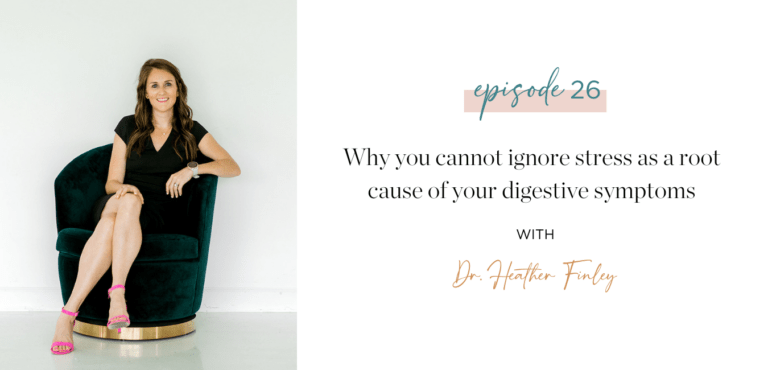When experiencing digestive symptoms, how often do you recognize that stress could be the root cause?
In this episode of the Love Your Gut Podcast, I talk about stress, the different types of stress, stress’s effects on our bodies and digestive systems, and how to manage our stress before it becomes overwhelming.
Topics Covered in This Episode:
- [02:39] Let’s define stress.
- [03:35] The stress bucket.
- [05:10] Physical stress.
- [05:49] Emotional stress.
- [06:42] Nutritional stress.
- [07:13] Chemical/toxic stress.
- [07:45] Other stresses.
- [09:29] How stress affects your digestion.
- [16:06] Stress management.
- [18:01] The power of no.
- [18:50] How your digestive issues affect you.
- [19:28] Action steps.
If this episode has been helpful, hit me up on Instagram, and tell me about your experience!
Recommendations:
- Root cause testing: Take This Quiz.
- Reducing stress: waking up earlier, walking in the sun, reading before bed instead of scrolling social media, acknowledge stress as a root cause, make a list of stressors that you can reduce/manage.
Follow & leave a review on Apple Podcasts.
If you’re new here, I encourage you to follow the podcast today, so that you don’t miss any future episodes!
Pre-order my book: The Healthy, Happy Gut Cookbook
Quotes:
- “Anything that puts your body in that stressed state is going to inhibit your digestion.”
- “Stress management and stress reduction are critical for optimizing your gut and your microbiome.”
- “I want you to not dismiss stress as a root cause.”
Connect with Dr. Heather
Follow the Podcast
Follow Along on Instagram
Follow Along on Facebook
Follow & Review on Apple Podcasts
Are you following my podcast? If you’re not, I want to encourage you to do that today so you don’t miss any future episodes! I would also appreciate it if you would leave me a review on Apple Podcasts or Spotify! I read each of them, and they help me make sure I am providing the content that you love to hear
TRANSCRIPTION:
SPEAKERS
Dr. Heather Finley
Dr. Heather Finley 00:00
Stress isn’t actually always negative or apparent, because we go through changes all day long, and some stress is actually beneficial. But the problem becomes when stress starts to overtake the rest of the symptoms that you’re experiencing, and your stress bucket as I like to explain to our clients becomes full. Hey, welcome to the love your gut podcast. I’m your host, Dr. Heather Finley, I know what you’re thinking, how am I supposed to love my gut when all it does is hold me back. I thought the same thing before I found my own relief from my own gut health issues. I dedicated my life to getting to the bottom of my own gut issues, so I can help women just like you transform theirs. Now I’m here to guide you through your own gut health journey. We do this through identifying your root causes and making sustainable and transformational changes. As a result, you can unleash your true potential. My goal is to empower you with the information and tools you need to love your guts. So it loves you back right here on this podcast. Hello, hello, and welcome back to the next episode of the love of gut podcast. If you missed last week’s episode, I would actually encourage you to pause and go back and listen to last week’s episode on how to identify your root cause. Because it will provide a bit more context into today’s episode, where I’m going to be breaking down the top root cause that we see with our clients as well as that I see for all of you that have taken my quiz. So if you haven’t taken the quiz, I’ll link it in the show notes. But the quiz is helpful for getting you started on identifying the root cause. And like I said, That’s what last week’s episode was all about. Over here at the GutTogether program and on the love your gut podcast, we are highly passionate about actually helping you identify what’s causing the symptoms versus just masking them with a band aid fix. So since like I shared last week, about 74% of you score stress as your number one root cause I thought it would be beneficial to break that down. Because often I get this like dreaded disappointment from people when they take the quiz. And they’re like, it’s stress, but I’m not stressed, I don’t feel stressed. And as I explained to them, that stress isn’t just about how you feel, it starts to make a lot more sense and brings a lot more clarity. So that’s what today is going to be all about. And we’re going to just dive right in. So
Dr. Heather Finley 02:42
first I want to start by just defining stress. Stress is any constraining force or influence, stress can be physical, chemical, or emotional stress can even be an intense effort or exertion. If you are a marathon runner, or if you are a weightlifter, any intense effort. But essentially stress is going to cause alterations in your equilibrium. Stress can also be feeling worried or anxious. So hopefully what you’re getting from this is, stress is any change. Stress isn’t actually always negative or apparent, because we go through changes all day long, and some stress is actually beneficial. But the problem becomes when stress starts to overtake the rest of the symptoms that you’re experiencing. And your stress bucket as I like to explain to our clients becomes full. So let’s break down the concept of a stress bucket. Your your body should be good at filtering out stress, you can think of it like if you’ve ever been to the to the beach, those buckets that have the gradient on the bottom that allows sand to filter through so you can scoop the sand into the top of the bucket. And that way, then all the shells are filtered out and you can then go wash the shells and keep them afterwards. So if you think of your stress like that, we should be able to filter out our stress throughout the day fairly easily. But with our modern lifestyle, that’s not always the case. So we pile things on day after day, minute after minute, and all the sudden, those little holes get full and nothing can filter through maybe the bottom gets filled with like tar from the beach or something that’s preventing that sand or that stress from filtering through. So now your bucket is starting to overflow and the sand is coming out of the top versus out of the bottom. So as I mentioned at the beginning, stress can be physical, it can be emotional It can be nutritional, and I’ll get into that in a second chemical or toxic and it could even be over exercising excess caffeine under eating, which would be more nutritional. So let’s break each of these down. Physical physical stress could be an infection, maybe a gut infection, maybe you have h pylori infection that’s been unaddressed. Maybe you have a chronic disease that’s going to cause more stress and strain on your body. Maybe you have an autoimmune disease, maybe you have really bad allergies, which is a gut issue. Maybe you have chemical sensitivities, which is also typically related to the gut. Maybe you are training for a marathon or you’re over exercising, and so your body literally can’t recover from the exercise that you’re doing. And your body is just super depleted. Then we have emotional stress. So this could be financial issues. This could be relationship drama, this could be past or current trauma, it could even just be lack of purpose, anxiety, outside influences, physical abuse, guilt comparison,
Dr. Heather Finley 06:11
I would even rope just not having hobbies or joy or pleasure in your life into this category, which we see often with our clients, their life revolves so much around their gut issues that they’ve restricted themselves from everything in their life. And there’s no purpose or there’s no pleasure, and there’s no joy, and you need pleasure and joy. There’s actually physiological things that happen when you laugh, and you experience pleasure and joy, that are healing to the body. Then we have nutritional stress. So this could be overeating, under eating caffeine, alcohol, food allergies. And we see this all the time with our clients. Typically more on under eating, their digestive issues are so uncomfortable, they’re so bloated, they’re so miserable, that they’re just generally not getting enough calories throughout the day. So of course, their body is stressed because it doesn’t have the fuel that it needs to function. When we’re talking about chemical or toxic stress. It could be from an overworked liver or maybe from excess caffeine or medications could be from household goods, the chemicals that you’re exposed to. I know it could even be living near a factory or somewhere with high radiation, maybe hopefully not the case for anyone listening but limited access to clean air or water. That’s definitely a stress could even be what you’re putting on your skin. Your skin is your largest organ and you absorb things through your skin. So stress could also be broken bones, frustration, travel. Again, that’s not an necessarily a negative thing. But it’s a change technology, social media, a raised voice negativity, clutter, guilt, toxins, I think you’re getting the point. It could be even dehydration of physical trauma. We experience stress all day long. So no wonder 74% of you score stress as your root cause because now that you understand that stress isn’t just emotional. There’s so many stressors that we experience on a daily basis that are contributing to the digestive issues that you’re having.
Dr. Heather Finley 08:34
Hey there, I know you are absolutely loving this episode. But I am so excited because my book The healthy happy gut cookbook is now available for pre order. This book is designed to help you identify the causes of your symptoms, give you really actionable steps to address them, and help you love food again and get back in the kitchen. So not only is it packed with tons of info, it’s also packed with over 50 delicious recipes that I’m so excited for you to try. When you preorder this book, you not only get the book on your doorstep on December 20, just in time for Christmas, but you also get access to some bonus trainings and a live q&a call with me in December. So we’ll be releasing more info about that soon. But I would absolutely love it if you would pre order the book and share it with a friend who might need it as well. The link to preorder the book is in the show notes and also on my website.
Dr. Heather Finley 09:30
So I want to talk about how stress actually affects your digestion. When you are stressed. Your body senses that there is a tiger sitting next to you. And if there’s a tiger sitting next to you at your dinner table, you are likely not going to just sit there and eat your meal you’re going to run away and any stress on the body whether it’s a broken bone, whether it’s from under eating whether it’s too much time on social media, anything that puts your body in that stressed state is going to inhibit your digestion. Because if your body is thinking that it is getting ready to run away from a tiger, why would it be focused on digesting a meal, and that actually starts with the effects the entire digestive process, it starts with saliva. So if you’re unfamiliar with the process of digestion, it’s very interesting and actually starts even the process of digestion starts even before Food enters your mouth. I explained this last week, but you’ve probably all had an experience where you’ve walked by a bakery, and you smelled something and you’re, you started salivating and you thought, Well, I wasn’t hungry, until I smelled that. That is the cephalic phase of digestion, you start salivating, your saliva has enzymes, and that saliva then signals to your stomach, your liver, your gallbladder, your pancreas to do their thing, and secrete the enzymes needed for digestion and break down. So when you’re stressed, you actually have less saliva production. So that inhibits the rest of the digestive process, it’s going to slow enzyme production, it’s going to slow break food breakdown, and it gets you out of the rest and digest state. On the other hand, if it’s an acute stress, so maybe you are giving a big speech, or maybe you were an athlete back in the day, and you always were running to the bathroom right before your event, that is a stress response. It is a gut brain response. Your body is saying, Hey, we have a big stressor, we need to get rid of everything. And so you’re running to the bathroom. So for those of you that struggle more on the loose stool, diarrhea end of the spectrum, think about how your situations affects this. Are you having episodes every time you leave your house? What is causing that stress? Are you having episodes every day, when you walk into work, think about how those situations and the anxiety and the stress is affecting that situation. So when you’re stressed, your digestive process shuts down, starting with saliva, then with enzyme production and stomach acid production. And then with gut motility. So long term stress, which is what most people experience this overloaded stress bucket because there’s so many stresses in their life, that’s actually going to also slow gut motility. So for those of you that struggle with constipation, and bloating, then the stress is definitely at play. And it could be, as I mentioned earlier, stress from an actual infection in your gut, but it also could be stressors from the rest of your life. And what I want you to hear here is that the goal is not to get rid of off stress. I know I’ve posted many times on social media before about stress and managing stress and how this affects digestion. And often I’ll get comments like, well, wouldn’t it be nice to not be stressed, and you’re missing the point. The point is not that we aren’t ever going to be stressed or that we can’t be stressed, like I said, some stress is actually good. It’s when the stress becomes too much, the body starts to shut down. Which means that incorporating stress management and stress reducing activities into your daily life is essential, especially in the modern day. And you if your automatic thought process there is I don’t have time for that, then you definitely need to make time for it. Because and I say that because that used to be me. I used to think, Yeah, that must be nice for all the rest of you, people that have time to breathe and meditate or go on a walk or whatever. But I’m too busy for that. And really, that’s what I needed the most. So you don’t stress management doesn’t have to look like you sitting in a fancy yoga outfit. And meditating on the beach for 45 minutes a day. It could literally look like every time you start to feel overwhelmed, you’re taking three deep breaths. Or maybe you’re waking up 10 minutes earlier so that your morning isn’t rushed, so you’re not starting your day off stress. Or maybe it looks like you walk outside in the sun for 10 minutes in the morning before you start your day or during your lunch break. There’s little ways that you can add in stress management to help improve your digestion. It could even look like and I know this is a change that a lot of our clients make is reading before bed instead of scrolling social media. We’re all guilty of that. But that’s a way to reduce stress and stop the comparison game right before you go to bed. So the stress process looks like Your brain is alerted. Your hypothalamus is then talking to your pituitary glands. Your adrenal glands are making cortisol, your body is releasing glucose so that your muscles have fuel to run away from the stress. And your body is just in this constant state of fight or flight, and in the state of sympathetic versus parasympathetic. So if you’re unfamiliar with these nervous system states, your sympathetic nervous system is your fight or flight. When you are in a sympathetic state, because of too much stress, this actually reduces the amount of good bacteria in your gut, it increases your susceptibility to pathogens. So stress management, and stress reduction are critical for optimizing your gut and your microbiome. And without these, it’s very hard to heal. Oftentimes, our clients that gets stuck or will work with people that will say, I’ve tried everything, or I’ve, you know, I’ve done it all, it usually goes back to their nervous system, and their stress response. So stress management is kind of a lot like charging your phone. And this is obviously very oversimplified. But if you’re anything like me, your phone is always on 10%, it stresses my husband out to no end. But my phone is always on the fritz of dying. And that’s kind of how stress is, as well, if your phone battery’s always on 10%. And you’re always about to, the battery is always about to deplete. That’s how our bodies are, too. If you’re so depleted that you’re barely getting back up to 10% each day, that is going to affect your gut. So I want you to think about how can you actually pull yourself in to be fully recharged so that all the daily stressors, don’t just completely take your battery, so that when something stressful at work happens, it doesn’t just completely shut your body off or shut your phone down? It depletes a little bit, but you still have adequate capacity and adequate energy reserves to do what you need to do throughout the day. But if you don’t have any kind of stress reducing activity or stress reduction practice in your life, you will feel like your phone is always on 10%. And something’s always going to be the thing that shuts it off.
Dr. Heather Finley 17:34
I read some stat, I can’t remember where it was, but that 75 to 90% of primary care visits have been reported as stress related. And I believe it especially in the last couple of years, we have so much stress, we have so much anxiety. Our bodies are not designed for this, our bodies were designed for short periods of high intensity stress. But we are on stimulation overload from technology and screens and to do lists that never end running from event to event over commitments and even just noise. So here’s what I want you to think about. One is the power of No, how can you set boundaries? How can you take time to unwind? How can you take time for yourself because that’s not selfish, it is essential, you need time to de stress you need time to relax, you need time for fun, because without this, it is going to be so hard for your body to heal. Especially if your body is already under stress with the digestive issues that you might have. Maybe the digestive issues you could handle on its own, maybe the infection or the H Pylori or the lack of good bacteria. But with the mountain of other stressors you have on your life, your body literally can’t hang. So I want you to think about how your digestive issues actually affect you. Maybe they give you exhaustion or fatigue or anxiety or worry. Maybe you feel scattered. Maybe you have brain fog. That’s a really common one that we see our clients really improve on when they are able to address their gut issues. Maybe you have difficulty falling asleep, you’re constipated, you’re bloated. Think about the daily stress that this adds on to you and then on top of everything else that you’re managing. It’s a lot. So here’s some action steps that I want you to take first, I want you to not dismiss stress as a root cause I think it’s very easy to say like, yeah, stress, but you know, there’s nothing I can do about it. And this is the way that my life is and yes there are certain stressors that likely you can’t get rid of But there likely are stressors that you can get rid of. And maybe that looks like asking for help. Or maybe it looks like going to bed 15 minutes earlier, or even meal prepping to reduce stress, instead of wondering what you’re going to eat every night, when you get home from work, maybe you spend a little bit of time on the weekends, to reduce stress throughout the week, there’s little things that you can do that can make a huge difference. So that’s step one is I want you to not dismiss stress as a root cause and start maybe making a list. So that’s step two, make a list of all the things that are adding stress to your life and your digestion. And then step three, is I want you to make a another list of what are the things that you can let go of? Or maybe you just cross them out? What are the what are the stressors that you can get rid of? What are the stressors that you can outsource or ask for help on? And then for the stressors that you can’t get rid of? How can you manage them better. So I know this was a little bit different of an episode. But I felt like it was time because it’s something that I talk about all the time. And it’s something that most people struggle with. So I really hope that you found this episode helpful. I’d love for you to reach out to me on Instagram and tell tell me what you found as most helpful, or any lightbulb moment that you had listening to this. And I really look forward to hearing how you are reframing your mindset about stress how you are maybe crossing things off your list that you can no longer do to reduce stress in your life, and then how that improves your digestion and improves all of the gut symptoms that you’re having.
Dr. Heather Finley 22:02
Please note that this episode is not a substitute for medical advice. And you should always consult your healthcare provider prior to making any changes.
I’m giving your gut a thumbs up because you just finished another episode of the love your gut podcast. Thanks so much for listening in to this episode. I hope it was helpful.
I have to jump in and remind you that I have a free quiz that will help you finally figure out why you’re bloated. In order to live a life free of discomfort. You need to figure out what the root causes that’s making you experience these uncomfortable symptoms. The easiest and fastest way to do this is by visiting Dr.Heatherfinley.co/quiz. Take the quiz as soon as you can so you can transform your gut issues and lead a happier more vibrant life.









